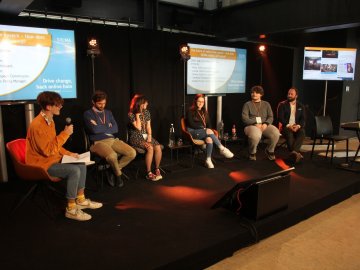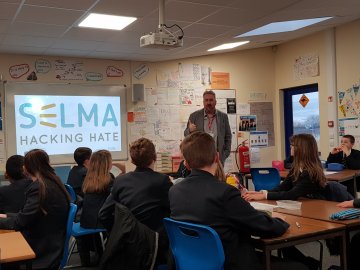What is online hate speech? Why does it thrive in an online environment, on social media and in videogames? How can children and young people be empowered to respond? To answer these questions, a comprehensive research programme has been put in place as part of the SELMA project.
Artemis K. Tsitsika (MD, PhD), Scientific Supervisor at "For Adolescent Health (FAH)", explains why it is important to establish a proper evidence base to inform the SELMA Toolkit development process:
"In order to address online hate speech effectively, it is fundamental to first understand what it is and how it works. Otherwise we risk missing the point in our preventive and remedial efforts. Our research will synthesise the available literature. Yet, we will also listen to the voice of youth and teachers. This will make it possible to develop versatile solutions, which address this complex problem in a way which is relevant and meaningful for teenagers."
In more practical terms, the SELMA research comprises three interrelated components enriching each other: a literature review, a series of focus groups and an online quantitative survey.
Literature review
The literature review will give an overview of existing definitions of online hate speech, while highlighting some of its key characteristics.
International institutions and organisations, such as the United Nations, the Council of Europe, and the European Commission, and a wide range of experts and academics, have all put different accents over time. Meanwhile, an eclectic mix of policies, action sand campaigns have been proposed or implemented across countries. "This variety of definitions and approaches makes it difficult to assess what works and what doesn't." Prof. Tsitsika explains. "We need to start from a clear understanding of what hate speech is, while building upon sound pedagogical tools and frameworks which can make a real difference."
More specifically, this part of the research will:
- Review existing definitions of online hate speech, exploring the contexts in which it occurs, and the consequences it may have. It will also map existing policies and programmes across EU Member States, particularly in SELMA partner countries, i.e. Denmark, Germany, Greece and the United Kingdom.
- Analyse in more depth the possible role of Media and Information Literacy (MIL) and Social and Emotional Learning (SEL) approaches. This will help to shape and identify areas to be covered by the SELMA Toolkit.
Focus Groups
Three series of qualitative focus groups will be carried out across SELMA partner countries. The focus groups will complement the evidence collected in the literature review. It will bring in the views of youth from diverse backgrounds, providing a more nuanced empirical understanding of how young people experience and respond to online hate speech.
More specifically:
- The first set of focus groups explores, in their own words, how teenagers (from 11 to 16 years old) perceive online hate speech, its causes and impact, as well as possible sources of help and coping strategies.
- In the second round, young people, teachers and other key target groups will pilot test the SELMA tools and resources as they are being developed.
- The third series will collect feedback from across relevant target groups on the final set of SELMA materials and activities.
Online quantitative survey
An online quantitative survey for teens and teachers will set a more structural point of reference, while feeding into a first round of cross-European campaigning. The survey has been launched in English (teens and teachers), German (teens and teachers), Danish (teens and teachers), and Greek (teens and teachers). The questionnaires will be open until October for any teenager or teacher interested.
All results will be integrated into a final public research report, to be published by the end of 2018. Keep an eye on our website or on #SELMA_eu and #hackinghate to learn more about the progress we make!






